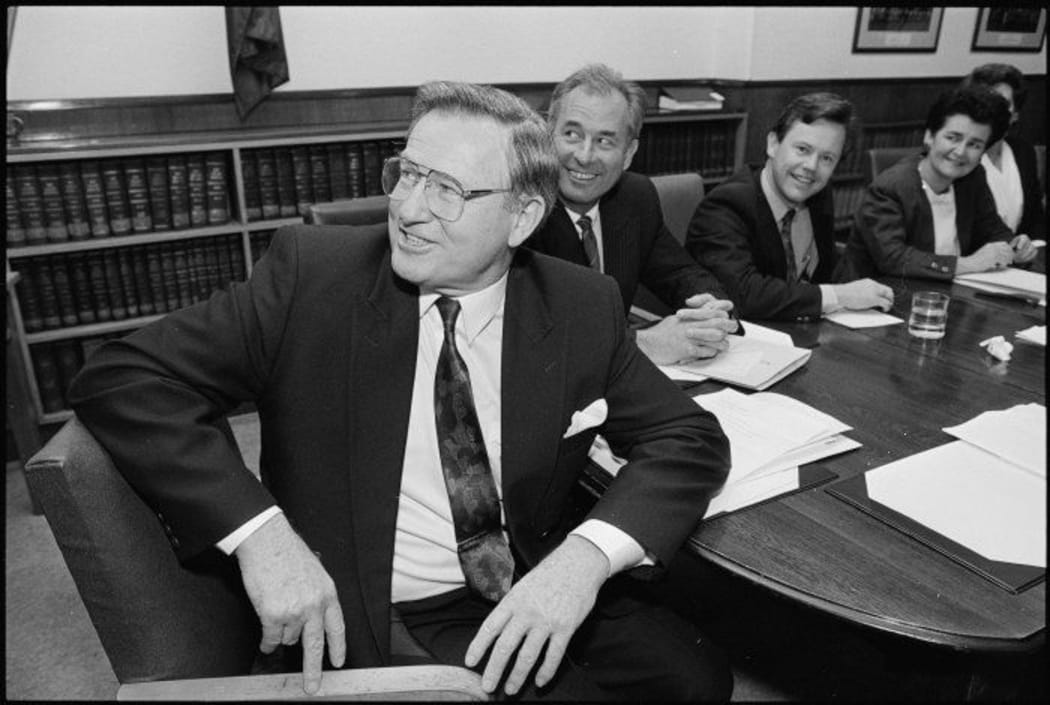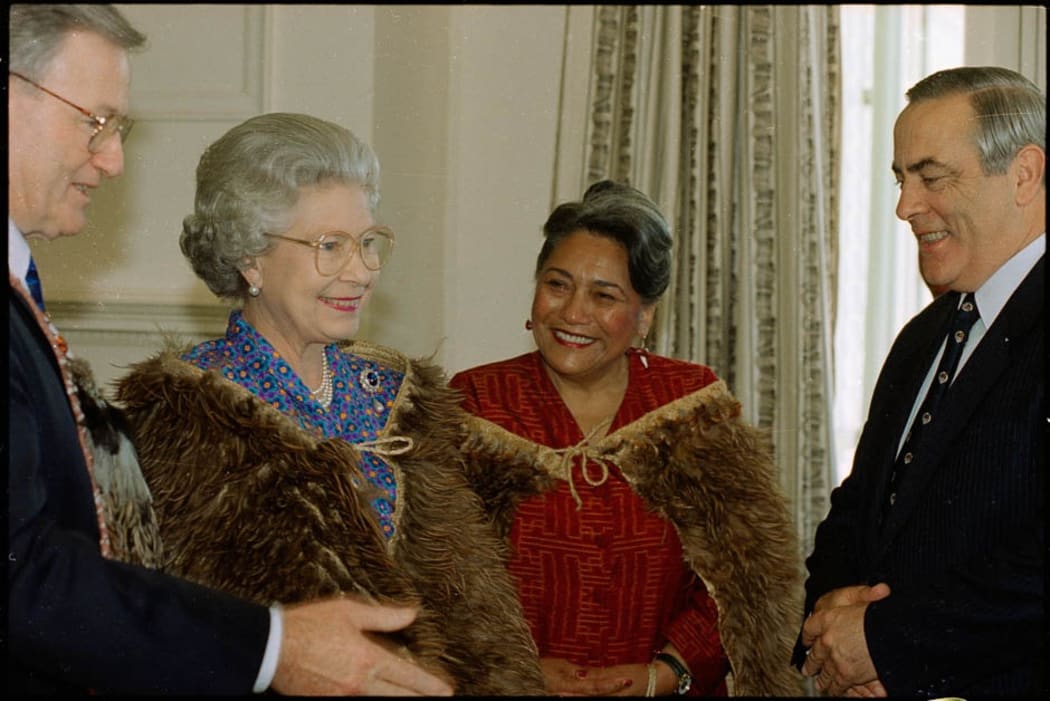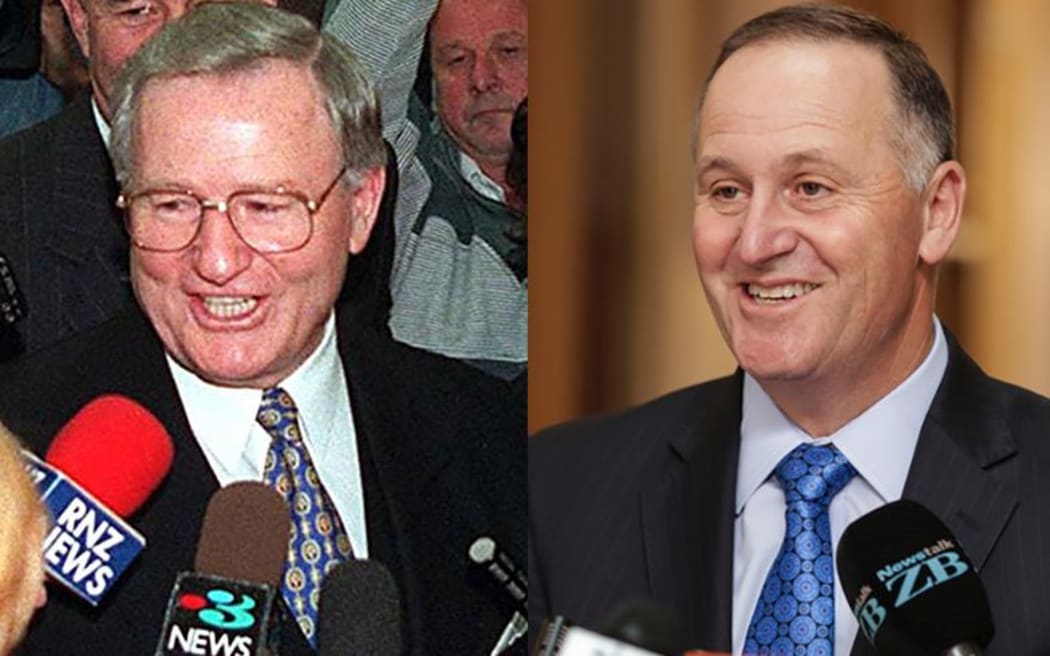In part three of The 9th Floor, Guyon Espiner talks to Jim Bolger, who steered New Zealand through a turbulent seven years that saw more economic upheaval, a resetting of race relations and the arrival of MMP.
By Guyon Espiner
I think Jim Bolger might be about to spark a debate. Two debates, actually. One on our economic settings and the other on race relations.
He says neo-liberalism has failed and suggests unions should have a stronger voice. He says Treaty of Waitangi settlements may not be full and final and that Māori language tuition should be compulsory in primary schools.
It was striking, sitting in Jim Bolger's Waikanae home for the third episode of The 9th Floor, just how many of the issues he grappled with in the 1990s are still alive and being debated rigorously today.
Adding to that sense of history was the fact that John Key resigned while we were discussing with Bolger what it was like to be a third-term National Prime Minister.
There was a little bit of personal history for me, too, and we'll come to that. But first the policy.
Bolger says neo-liberal economic policies have absolutely failed. It’s not uncommon to hear that now; even the IMF says so. But to hear it from a former National Prime Minister who pursued privatisation, labour market deregulation, welfare cuts and tax reductions – well, that’s pretty interesting.

Jim Bolger, Prime Minister-elect, at Parliament Buildings, Wellington, 1990. Photo: Supplied
“They have failed to produce economic growth and what growth there has been has gone to the few at the top,” Bolger says, not of his own policies specifically but of neo-liberalism the world over. He laments the levels of inequality and concludes “that model needs to change.”
But hang on. Didn’t he, along with Finance Minister Ruth Richardson, embark on that model, or at least enthusiastically pick up from where Roger Douglas and the Fourth Labour Government left off?
Bolger doesn't have a problem calling those policies neo-liberal although he prefers to call them “pragmatic” decisions to respond to the circumstances. It sets us up for the ride we go on with Bolger through the 1990s, a time of radical social and economic change.
“They [neo-liberal policies] have failed to produce economic growth and what growth there has been has gone to the few at the top” - Jim Bolger
Judge for yourself whether or not they were the right policies but do it armed with the context. Bolger describes his 17-hour honeymoon after becoming PM in 1990. He recalls ashen-faced officials telling him before he was even sworn in that the BNZ was going bust and if that happened nearly “half of New Zealand’s companies would have collapsed”.
The fiscal crisis sparked the Mother of All Budgets and deep cuts to the welfare state. Some believe this was the start of the entrenched poverty we agonise about to this day. How does the man whose election slogan was “The Decent Society” feel about that now?
There is so much to the Bolger years. The first MMP government with Winston Peters, the economic growth of the mid-90s, the birth of Te Papa and the first big Treaty Settlements.

Jim Bolger, Queen Elizabeth II, Dame Te Atairangikaahu and Sir Doug Graham at the Tainui treaty settlement, 1995. Photo: The Dominion Post / John Nicholson
Indeed Bolger is at his most passionate speaking about Māori issues. He has a visceral hatred of racism and explains the personal context for that.
We asked him whether future generations will open up Treaty settlements again - given Māori got a fraction of what was lost - or whether they are genuinely full and final. He says it is a “legitimate” question and “entirely up to us”.
If Māori are still at the bottom of the heap “then you can expect someone to ask the question again because it means that society has failed”. He is also scathing of former National leader Don Brash’s Orewa speech on ‘Māori privilege’. “It wasn’t anywhere near as bad as Trump but it was in that frame.”
Of course Don Brash never made it to PM, replaced by John Key in 2006. ‘Gone by lunchtime,’ was the political phrase popular at the time.
When we returned to Bolger’s house after our lunch break, Key was gone too, one of those rare times when “shock resignation” is an accurate headline.
Bolger was buzzing as we talked long into the afternoon, feeling fate had settled in with him on the big chair in the lounge of his stately home.

Jim Bolger was replaced as NZ Prime Minister in 1997, while John Key stepped down from the role last year. Photo: AFP / RNZ
I felt it, too. My first day as a political reporter was Bolger’s last day as an MP. I was asked to cover the valedictory for The Evening Post, a task I felt hopelessly ill-prepared for.
In his parting words to Parliament in April 1998, Bolger looked up at the Press Gallery and invited us to “take out your quills and bury me one final time”.
We’ve done the opposite here, I hope, and dug up the past for The 9th Floor. It’s 19 years later – almost to the day – and I think we’re all a little bit better prepared to look at his legacy.
The 9th Floor will hear from two more former NZ Prime Ministers over the next few weeks - Dame Jenny Shipley and Helen Clark.
Interviewer - Guyon Espiner
Executive Producer - Tim Watkin
Director/Editor - Claire Eastham-Farrelly
Camera/Editor - Rebekah Parsons-King
Editor - Damian Golfinopoulos

